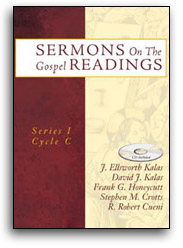SermonStudio
Moving In
Sermon
Sermons On The Gospel Readings
Series I, Cycle C
Philip Yancey, the best-selling author, once holed up in a mountain cabin for two weeks during a Colorado winter. His intent was to bring a stack of books and do some work on several writing projects. What happened instead is that he opened only one book: the Bible. He began at Genesis and read straight through as the snow fell, six feet of fresh powder in all. By the time he reached the book of Revelation, Yancey had to call someone to clear the driveway.


